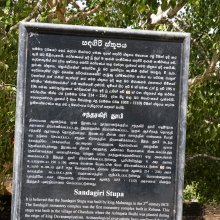Andu, Amdu: 16 definitions
Introduction:
Andu means something in Buddhism, Pali, Hinduism, Sanskrit, Marathi, Jainism, Prakrit. If you want to know the exact meaning, history, etymology or English translation of this term then check out the descriptions on this page. Add your comment or reference to a book if you want to contribute to this summary article.
Images (photo gallery)
In Buddhism
Theravada (major branch of Buddhism)
Source: Pali Kanon: Pali Proper NamesA village near Pulatthipura. Cv.lix.5.
Theravāda is a major branch of Buddhism having the the Pali canon (tipitaka) as their canonical literature, which includes the vinaya-pitaka (monastic rules), the sutta-pitaka (Buddhist sermons) and the abhidhamma-pitaka (philosophy and psychology).
Languages of India and abroad
Pali-English dictionary
Source: BuddhaSasana: Concise Pali-English Dictionaryandu : (m.) a fetter; a chain.
Source: Sutta: The Pali Text Society's Pali-English DictionaryAndu, (cp. Sk. andu, andū & anduka) a chain, fetter Vin.I, 108 = III, 249 (tiṇ°); D.I, 245; J.I, 21 (°ghara prisonhouse); DhA.IV, 54 (°bandhana). (Page 49)

Pali is the language of the Tipiṭaka, which is the sacred canon of Theravāda Buddhism and contains much of the Buddha’s speech. Closeley related to Sanskrit, both languages are used interchangeably between religions.
Marathi-English dictionary
Source: DDSA: The Molesworth Marathi and English Dictionaryandū (अंदू).—m (S) The chain or rope securing the feet of an elephant. 2 A piece of iron connecting and binding two walls or two stones. andū ghālaṇēṃ To confine, restrain, check, hinder; to cast an obstacle in the way of.
Source: DDSA: The Aryabhusan school dictionary, Marathi-Englishandū (अंदू).—m The chain to fasten elephant's feet. A piece of iron connecting and binding two walls or two stones.
Marathi is an Indo-European language having over 70 million native speakers people in (predominantly) Maharashtra India. Marathi, like many other Indo-Aryan languages, evolved from early forms of Prakrit, which itself is a subset of Sanskrit, one of the most ancient languages of the world.
Sanskrit dictionary
Source: DDSA: The practical Sanskrit-English dictionaryAndu (अन्दु) or Andū (अन्दू).—f. [andyate badhyate anena, and-kū, kūpratyayāntaḥ nipātaḥ Uṇādi-sūtra 1.93] also अन्दुकः, अन्दूकः (andukaḥ, andūkaḥ)
1) A chain or fetter.
2) A chain for the elephant's feet; गजमन्दूरिव निश्चलं चकार (gajamandūriva niścalaṃ cakāra) Śiśupālavadha 2.51; °निनादः (ninādaḥ) 11.7.
3) A sort of ornament worn round the ankles; cf. नूपुर (nūpura).
Derivable forms: anduḥ (अन्दुः), andūḥ (अन्दूः).
Source: Cologne Digital Sanskrit Dictionaries: Shabda-Sagara Sanskrit-English DictionaryAndu (अन्दु).—f.
(-nduḥ) See andū.
--- OR ---
Andū (अन्दू).—f.
(-ndūḥ) 1. An ornament worn round the ancles. 2. The chain for an elephant’s feet. 3. A chain, a fetter, a bond or tie. E. adi to bind, and kū Unadi aff. or with ku affix andu.
Source: Cologne Digital Sanskrit Dictionaries: Cappeller Sanskrit-English DictionaryAndu (अन्दु).—[substantive], andū [feminine] chain, [especially] for an elephant’s foot, or an ornament worn round the ankles.
Source: Cologne Digital Sanskrit Dictionaries: Monier-Williams Sanskrit-English Dictionary1) Andu (अन्दु):—[from and] f. the chain for an elephant’s feet
2) [v.s. ...] a ring or chain worn on the ancle.
3) Andū (अन्दू):—[from and] f. the chain for an elephant’s feet
4) [v.s. ...] a ring or chain worn on the ancle.
Source: Cologne Digital Sanskrit Dictionaries: Goldstücker Sanskrit-English DictionaryAndu (अन्दु):—f.
(-nduḥ) 1) A chain, a fetter.
2) An iron heel chain for an elephant’s foot.
3) An ornament worn round the ancles. Comp. the following and andū. E. and, uṇ. aff. ku; but see the Preface.
--- OR ---
Andū (अन्दू):—f.
(-ndūḥ) The same as andu. E. and, uṇ. aff. kū; but see the Preface.
Source: Cologne Digital Sanskrit Dictionaries: Yates Sanskrit-English DictionaryAndū (अन्दू):—(ndūḥ) 3. f. Idem. Also anduḥ.
Source: DDSA: Paia-sadda-mahannavo; a comprehensive Prakrit Hindi dictionary (S)Andu (अन्दु) in the Sanskrit language is related to the Prakrit words: Aṃdu, Aṃduyā.
[Sanskrit to German]
Sanskrit, also spelled संस्कृतम् (saṃskṛtam), is an ancient language of India commonly seen as the grandmother of the Indo-European language family (even English!). Closely allied with Prakrit and Pali, Sanskrit is more exhaustive in both grammar and terms and has the most extensive collection of literature in the world, greatly surpassing its sister-languages Greek and Latin.
Prakrit-English dictionary
Source: DDSA: Paia-sadda-mahannavo; a comprehensive Prakrit Hindi dictionaryAṃdu (अंदु) in the Prakrit language is related to the Sanskrit word: Andu.
Aṃdu has the following synonyms: Aṃduyā.
Prakrit is an ancient language closely associated with both Pali and Sanskrit. Jain literature is often composed in this language or sub-dialects, such as the Agamas and their commentaries which are written in Ardhamagadhi and Maharashtri Prakrit. The earliest extant texts can be dated to as early as the 4th century BCE although core portions might be older.
Kannada-English dictionary
Source: Alar: Kannada-English corpusAṃḍu (ಅಂಡು):—[verb] to go near to; to come closer to.
--- OR ---
Aṃḍu (ಅಂಡು):—
1) [noun] nearness; proximity.
2) [noun] support; a prop; a shelter.
--- OR ---
Aṃḍu (ಅಂಡು):—
1) [noun] that part of human body between the lower back and the hind part of thighs; the buttocks.
2) [noun] the female genital passage; the vagina.
3) [noun] the bottom of a vessel;4) [noun] ಅಂಡುಬೆಳಗು [amdubelagu] aṇḍubeḷagu = ಅಂಡುಹರಿ [amduhari]; ಅಂಡುಮುರಿ [amdumuri] aṇḍumuri = ಅಂಡುಹರಿ [amduhari]; ಅಂಡುಹರಿ [amduhari] aṇḍuhari (dial.) (fig.) to beat heavily; ಅಂಡುಹಿಡಿ [amduhidi] aṇḍuhiḍi (dial.) (fig.) to sit idly at home; to spend time without doing any useful or gainful work; ಅಂಡು ಊರು [amdu uru] (ಅಂಡೂರು [amduru]) aṇḍu ūru (andūru) (sl.) to sit or rest for a short period; 2. (sl.) to stay in another’s house (usu. causing discomfort); ಅಂಡಿಗೆ ಅರಿವೆ ಇಲ್ಲ, ತುಟಿಗೆ ತೆಳಿ ಇಲ್ಲ [amdige arive illa, tutige teli illa] aṇḍige arive illa, tuṭige teḷi illa (prov.) to be very poor; he is so poor that he has no salt for his porridge; ಅಂಡಿಗೆ ಆನಿಸಿಕೊಂಡು ಬಾ [amdige anisikomdu ba] aṇḍige ānisikoṇḍu bā to become very essential; 2. to follow immediately or all along without giving any interval of time or space in between; ಅಂಡಿಗೆ ನೀರು ಬಿಡು [amdige niru bidu] aṇḍige nīru biḍu (prov.) to forget the help or favour received from another; to be an ingrate; ಅಂಡು ತಿರುಗಿಸಿಕೊಂಡು ಹೋಗು [amdu tirugisikomdu hogu] aṇḍu tirugisikoṇḍu hōgu to give no attention; to overlook; to show disrespect; ಅಂಡು ಬಡಿದುಕೊಂಡು ನಗು [amdu badidukomdu nagu] aṇḍu baḍidu koṇḍu nagu to laugh sneeringly.
--- OR ---
Aṃḍu (ಅಂಡು):—[noun] either of two oval sex glands in the male that are suspended in the scrotum and secrete spermatozoa; testicle.
--- OR ---
Aṃdu (ಅಂದು):—
1) [verb] = ಅಂದಿಸು [amdisu]; 2) to be reached; to be touched.
2) [verb] to fasten oneself; to glue to another.
--- OR ---
Aṃdu (ಅಂದು):—
1) [noun] that day.
2) [noun] that time; that point of time.
3) [noun] that period of time.
4) [noun] ಅಂದಿಗೆ ಅದೇ ಸುಖ, ಇಂದಿಗೆ ಇದೇ ಸುಖ [amdige ade sukha, imdige ide sukha] andige adē sukha, indige idē sukha (prov.) a contented person does not bother about fluctuations in his or her luck; a contented mind is a continual feast.
--- OR ---
Aṃdu (ಅಂದು):—
1) [adverb] at that point of time; then.
2) [adverb] on that day.
3) [adverb] during that period or time; under that circumstance; in that case.
4) [adverb] ಅಂದು ಬಾ ಅಂದರೆ ಇಂದು ಬಂದ [amdu ba amdare imdu bamda] andu bā andare indu banda (prov.) the stupid acts in a stupid way; ಅಂದಂದಿಗೆ [amdamdige] andandige daily; routinely; day to day; ಅಂದು ತೊಟ್ಟು [amdu tottu] andu toṭṭu since then; from that time or day.
--- OR ---
Āṃḍu (ಆಂಡು):—[noun] any of a genus (Capra) of wild or domesticated bovid ruminants with hollow horns; a goat.
Kannada is a Dravidian language (as opposed to the Indo-European language family) mainly spoken in the southwestern region of India.
See also (Relevant definitions)
Starts with (+21): Amdugal, Amduge, Amdugode, Amdugol, Amduke, Amdukokke, Amduvana, Amduya, Andu-dukot aridekdiket, Andu-giraketta, Andudukut, Andug, Anduga, Anduga-pisunu, Andugama, Andugandu, Andugapisunu, Andughara, Andugu, Anduk.
Ends with (+349): Abamdu, Abhipandu, Aciriyanikantu, Akshikandu, Alandu, Alarvamdu, Algandu, Aligamdu, Allittantu, Alpagodapandu, Amalapandu, Anasa-pandu, Anasapandu, Anathabamdhu, Andugandu, Annasapandu, Antantu, Antaravantu, Antimantu, Antu.
Full-text (+58): Anduka, Karnandu, Amduya, Antutallukai, Palandu, Palanduka, Kafau andu, And, Suntang'andu, Yang'andu, Attantu, Andu-dukot aridekdiket, Vantatti, Nataimutal, Antaiyar, Attirru, Pirantu, Calaynta, Aintacal, Taruna.
Relevant text
Search found 2 books and stories containing Andu, Andū, Amdu, Aṃdu, Aṃḍu, Aṇḍu, Āṃḍu, Āṇḍu; (plurals include: Andus, Andūs, Amdus, Aṃdus, Aṃḍus, Aṇḍus, Āṃḍus, Āṇḍus). You can also click to the full overview containing English textual excerpts. Below are direct links for the most relevant articles:
Expiatory Rites in Keralite Tantra (by T. S. Syamkumar)
8 (b). Temple Records on Expiatory Rites < [Chapter 4 - Socio-Cultural aspects of Expiatory Rites]
A History of Indian Philosophy Volume 3 (by Surendranath Dasgupta)
Part 1 - The Chronology of the Āḻvārs < [Chapter XVII - The Āḻvārs]


